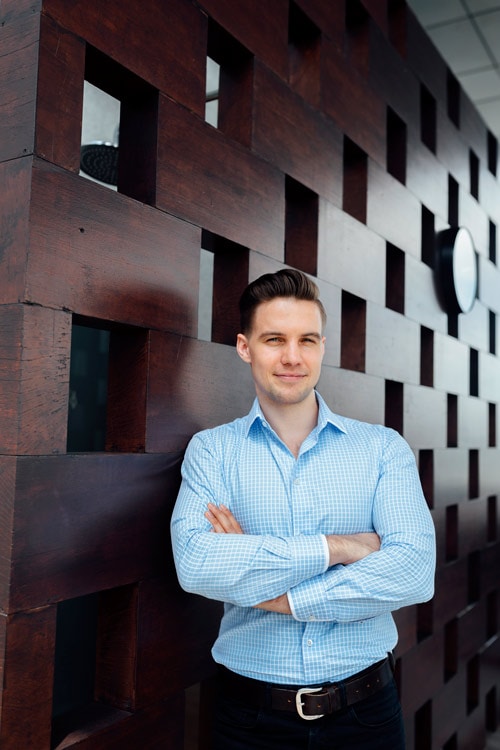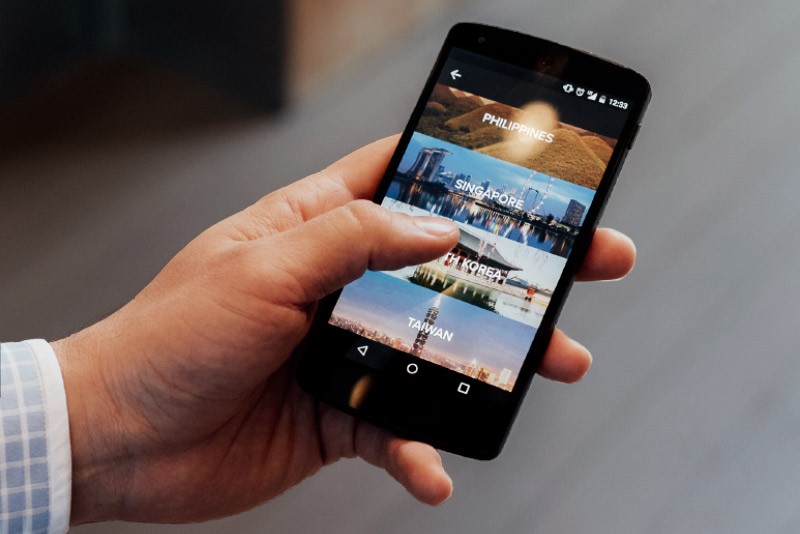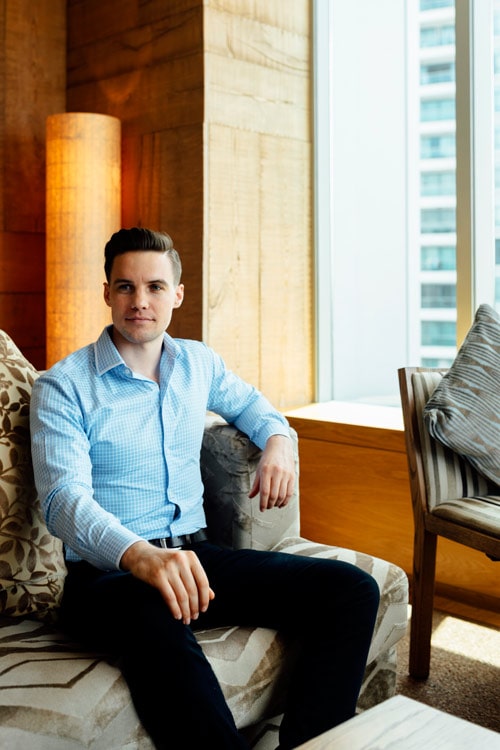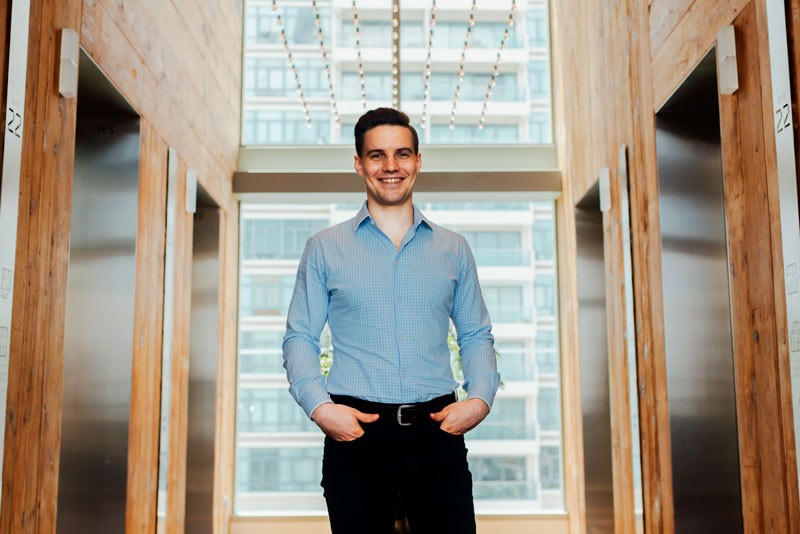Tomas Laboutka: Enabling Spontaneous Travel

It’s eleven in the morning and I’m already Tomas Latboutka’s fourth meeting. “It’s a pretty intense day,” he says, without even a slight hint of that. We’re at Oasis Hotel, one of HotelQuickly’s twelve thousand partners across two hundred and fifty locations. The last-minute hotel-booking app he co-founded is riding the on-demand, mobile-first wave, where practically everything and anything are being made available at the touch of a button—cabs, cars, cleaners, helicopters, planes, meals, financial advice, counselling, dates, excuses to get out of bad dates—whatever you can think of. In HotelQuickly’s case, a quick swipe lets you book a hotel room. This ease drives what Tomas calls ‘spontaneous travel’. “Travel is so much easier when it does not come with the homework—we do the homework for you,” he tells me. “You want to go to Bali this weekend? Just go!” His hundred-strong team has an average age of twenty-seven, who serve an equally young demographic. “We are a young team serving a young customer base,” says the thirty-year-old Czech. “I'm the old guy here.” Through HotelQuickly, the hotels see an effective channel to attract the mobile generation striving for social proof. “For millennials, travelling is part of social proofing,” he explains. “You take a picture from Bali or Phuket—look at me! I'm enjoying good food and exploring a new place.” Turning his attention to OTAs [Online Travel Agencies], he adds that hotels have a love-hate relationship with them. “If I google a specific hotel, the first ten links are probably to the OTAs, so I end up booking through the OTAs—hotels are not very happy with that,” he adds. “For us, we rotate the offers on the app all the time, so if I want to book a room at a particular hotel, it might or might not be featured, depending on your query.” Moreover, for the brand-agonistic, HotelQuickly helps them discover new places to stay at. “I felt a lot of what I had learned in business school was pretty useless—a theoretical cloud, so I was very frustrated,” says the serial entrepreneur, so while at University, Tomas would attempt to apply frameworks and theories he was taught, which led him to start a tutoring business, and later, a talent acquisition consultancy, which he sold just before the 2007 Financial Crisis. “When I was younger, I under-appreciated experience,” he recounts. “To be able to see the right context comes with experience. Without it, you won’t really get it. You may think you understand the advice, but you don’t.” He returns to Prague, where he grew up, about twice a year to visit friends and family. “Prague hasn’t been attacked or destroyed for seven hundred years. If you have never been, please go! It’s beautiful.”
YONG HUI YOW: Why did you acquire Tonight?
TOMAS LABOUTKA: Since our Series A, we’d already planned on entering the Japanese market. We have a common investor, GREE Ventures who understands the opportunity very well. We understand we can only succeed in Japan with strong local partners; it would be impossible otherwise. I’d been on the board of Tonight, but we did not previously have any ownership interest. With this acquisition, we see a huge opportunity for us to accelerate our growth in Japan. We have about a hundred people now, about fifteen people working on systems; we also have business intelligence, and a whole support apparatus, and this will complement the team in Japan very well. We have a very entrepreneurial culture, with a focus on executing quickly.
YONG HUI: Why is now a great time to enter the Japanese market?
TOMAS: The number of inbound tourists to Japan is skyrocketing. Last year, it went from 20 to 37 million. Japan is also dropping many of its Visa requirements, and will be hosting the 2019 Rugby World Cup, as well as the 2020 Olympics. All these developments will boost tourism. Hence, this is the right time to put the pedal to the metal and accelerate our entry into Japan.
YONG HUI: You're not in China.
TOMAS: I think China is a different planet altogether to be honest. The ecosystem there is hugely dominated by a few players, and recently, it became even more monopolistic. We are a Singaporean company and team, and what works here could also work well in Hong Kong. China will require a completely different approach, and given the market dynamics, it is going to be extremely tough.
YONG HUI: How many bookings have been made on HotelQuickly?
TOMAS: I would love to tell you but I can’t. What I can tell you, however, is we are growing like crazy. We grew about 1000 per cent last year, which is a tenfold increase!
YONG HUI: What is the typical use case for HotelQuickly?
TOMAS: Most of our use cases in Singapore are staycations and quick getaways. What we enable people to do is travel spontaneously. We break down the barriers so people can travel more, and in the long run, this also helps people better understand other cultures. If you have never been somewhere, it is easy to form impressions from consuming media and some generalisation bullshit.
YONG HUI: What's driving spontaneous travel? Stress?
TOMAS: In Singapore, I think there’s quite a bit of stress. On the weekends, you just want to relax and unwind. But there is no reason why people should not travel this way all the time, whether for leisure or business. Years ago, if you wanted to go to Bali, you’d open up catalogues and call the travel agencies who would offer you the three hotels available, and they would be expensive, and not what you want. So you go back and forth before settling on something. It takes seconds to book a hotel with HotelQuickly. When online bookings came about, you’d still have to open up ten web pages that give you different rates. What we try and do is close this research window altogether. You want to go to Bali? Just go! Just open the app, and we’ll show you the best hotels, with guaranteed best prices so you don’t need to open up any other site. For millennials, travelling is part of social proofing. You take a picture from Bali or Phuket— look at me! I'm enjoying good food and exploring a new place. This is just so much easier when it does not come with the homework. We do the homework for you.
YONG HUI: How long in advance can people book on HotelQuickly?
TOMAS: Even though you can book up to a week in advance, most of our bookings are moving closer to being spontaneous. This is part of being a pure mobile play, like Uber or Grab with no website. On mobile, you want things to happen right now, from taking a picture to booking a cab. It is the same thing with us.
YONG HUI: What is the breakdown between staycations and business travel?
TOMAS: It depends on the time of the week. Over weekends, staycations dominate. In Singapore, there is a lot of inbound business travel from the region, and with our great prices, you can upgrade from a four-star to a five-star hotel, or a three-star to four-star. The hotels see us as a different distribution and customer acquisition channel to attract the mobile generation. At the same time, they are able to discount and sell unsold rooms to a closed, private group.
YONG HUI: How many destinations do you have partners in?
TOMAS: We have over two hundred and fifty destinations.
YONG HUI: Are direct bookings via hotels' websites falling due to apps like HotelQuickly?
TOMAS: I hope not. At the end of day, we have a very synergistic relationship with hotels. The hotels, however, have a love-hate relationship with the OTAs, because let's say I'm looking for a hotel in Novena. If I google the hotel, the first ten links are to the OTAs, so I end up booking through the OTA. For us, we rotate the offers on the app all the time, so if I want to book a room at a particular hotel, it might or might not be featured. We feature the best deals based on your location and search terms. For people who are brand-agonistic, we allow them to discover something new, and then they can book directly next time.
YONG HUI: Do you do surge pricing?
TOMAS: No, we don’t, but I don’t disagree with that practice. It makes a lot of sense for Uber and similar apps. For us, surge pricing comes from hotels. If you have SG50 celebrations coming up for example, prices goes up, and we get the prices from the hotels. What we do is give you the best rates relative to the others guys. The better the deal, the higher the chance a hotel will be featured on HotelQuickly. A lot of the real magic and number-crunching happens in the backend. We can see all the rates in real-time and optimise for your searches. What you see is different from what I see because we search for different things.
When you have disruption, businesses are forced to evolve and adapt. The ones that adapt end up understanding their customers better; those who stand still perish, and that is a good thing.
YONG HUI: With all the talk of Airbnb eating hotels’ lunch, is HotelQuickly saving the hotels?
TOMAS: I would not position myself as a messiah, but disruption is a good thing as it changes the way people think and behave, and forces everyone to do a better job. Sometimes they stay at hotels, sometimes they stay at an Airbnb property. This means hotels will try harder to provide the service which makes people want to stay at hotels. Airbnb attracts people with other things. When you have disruption, businesses are forced to evolve and adapt. The ones that adapt end up understanding their customers better; those who stand still perish, and that is a good thing. Five years ago, if you told anyone they will jump into a car with a stranger, you will be like—sure! Not going to happen ever, right? It’s the same with staying at a stranger’s home. If I said you will not need to book in advance, or open up ten pages to find a hotel, you would not have believed it too. At the end of the day, it improves your life if you don’t have to wait in line for a taxi.
YONG HUI: How do you think the less-than-stellar outlook will affect your business?
TOMAS: For one, we are not an oil company, so financial markets don’t really give us a direct blow. If anything, people will probably travel more because we let them do so in a cheaper and easier way cheaper and easier. If overall hotel occupancies go down, we can help the hotels too.
YONG HUI: Will the hotels over time become more dependent on apps like HotelQuickly as a channel?
TOMAS: Over time, we enable them to focus on what they do best—hospitality and experience, and in the meantime, incentivise more people to travel. If we can help them do that, that is a great thing.
At the end of the day, your whole life is just made up of how you look at things.
YONG HUI: How do you think the experience of checking in and out of hotels will change over time with apps such as HotelQuickly?
TOMAS: That’s a good question. In this aspect, there is a little bit of schizophrenia in my opinion, because on one hand, you see a lot of automation in the processes. You have instant booking, keyless access, which expedites the whole checking-in process. On the other hand, these processes are when the hotels can build a relationship with the customer. They can use this interaction to showcase their hospitality and differentiate themselves with the human touch. I think some sort of hybrid between both ends of the spectrum is ideal. For instance, hotels may be able to recognise you when you come in and personalise their services to you, by addressing you by name for instance, and knowing what your favourite drink, room and other preferences are. That will impress you. If you have to queue up so front desk can ask for your passport, you’re like—what? This is the fifth time you’re there. So processes will become increasingly frictionless, but is it going to completely eradicate the human element? I don’t think so.
YONG HUI: Hotels do not personalise or expedite checking in of a HotelQuickly guest?
TOMAS: I wish, but not right now. However, we have a direct communication channel with our hotel partners so they know a booking is coming from us. But we don’t have a special key or queue in the that sense. What we expedite now is the research, booking, payment, confirmation processes. The hotels have been incredibly helpful.
YONG HUI: Is expediting the checking-in process something you will consider to provide an even better experience?
TOMAS: Why not, but it comes down to scalability. We work with about 12,000 hotels, and to make sure it will be smooth, and not just a public relations stunt is more of a technical question.
YONG HUI: What did you do before starting HotelQuickly?
TOMAS: This is my third company. I sold my second. With that, I had a bit of cash, and an idea of what I want to do. My passion and excitement comes from execution and focus. As an investor, even if you are very hands-on, you are still juggling five or more projects. When I looked into this opportunity in 2014, I quickly fell in love with the model, the challenge, and the problem this is solving. I saw the huge opportunity in this region, and didn’t take me long to jump into this—from the idea to me landing in this region took two weeks. That was fun!
If money is my driver, I will be unhappy for the rest of my life. I don’t think there is anyone who can be happy just from having money alone.
YONG HUI: What would you consider to have made it?
TOMAS: I could get philosophical about this and go beyond the title of your magazine. Money is one measure of business success. At the end of the day, every business is there to make money whatever angle you throw at it. Having said that, to me personally, money does not really matter, whether it’s ten million, twenty million, hundred million, a billion, because there will always be people who have a lot more than I do. If money is my driver, I will be unhappy for the rest of my life. I don’t think there is anyone who can be happy just from having money alone. For me, it's more about being able to have fun and enjoy what I do. I want to do something meaningful, which contributes to the well-being of others.
YONG HUI: You seem to like philosophy.
TOMAS: I think philosophy is underrated in today’s society. People think it’s not relevant or practical today, and does not deliver immediate gratification, but that is a short-sighted view. I never studied philosophy, but what it does is make sense of what's out there from different perspectives. At the end of the day, your whole life is just made up of how you look at things. It is interesting to me the same way marketing or physics are.
Any given advice isn't good or bad per se. You should be grateful for advice you get, but how you apply it to your own context is key.
YONG HUI: What are bad advice entrepreneurs get?
TOMAS: Any given advice isn't good or bad per se. You should be grateful for advice you get, but how you apply it to your own context is key. There are tonnes of advice out there such as “Just do it”, or “Think it through”, “focus”, or “pivot”, and you go—what the hell am I supposed to do?
YONG HUI: Do you have a specific example?
TOMAS: When I was younger, I under-appreciated experience. Being able to see the right context comes with experience. A lot of times, you can only fully appreciate advice when you have the experience. If not, you won’t really get it. You may think you understand the advice, but you don’t.
YONG HUI: Any big announcements or plans this year?
TOMAS: Yes, we plan to announce a big feature some time soon. I cannot disclose much right now, but I will be happy to let you know once it is out.





